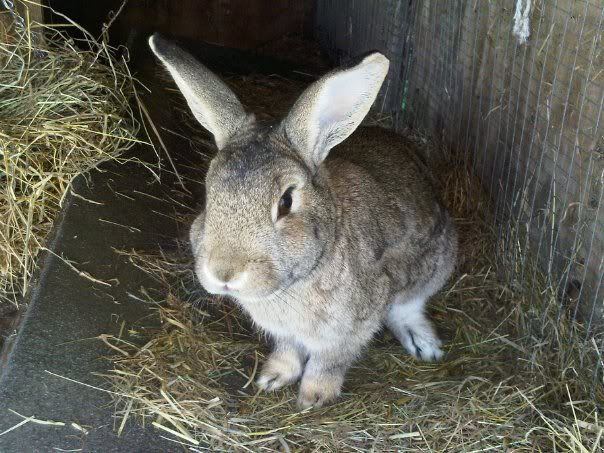I don't want to be controversial - this is a genuine question lol. I was wondering about it whilst I was cleaning my teeth this morning (I do some of my best thinking then! :lol .
.
It sort of follows on from the Breeding threads.
I'm *no* expert on rabbit breeds lol - I have a Rabbit and Small Animals Encyclopaedia but that just gives information on the looks etc of the breeds rather than health traits. But from what I've learnt about rabbits so far there seems to be a lot of associated health problems with different breeds.
Any lop-eared rabbit, it seems, will have some problems and disadvantages compared to an up-eared rabbit although this will vary from one rabbit to another and obviously there are extremes of this with the really long eared rabbits (from what I've read on here and other places - feel free to correct me!). Netherland Dwarfs are well known for having dental problems due to the shape of their faces. Larger breeds - French Lops and Conti's have shortened lifespan because of their size. 'Small faced' rabbits like mini lops who have 'squashy faces' may also be prone to dental issues - I'm well aware that this may happen with Hollie. Rexes have sore hocks etc.
I'm more familiar with the breeding world in Fancy Rats and just recently a group of breeders have openly declared their intent to actively work on increasing the lifespan of Fancy Rats - even if that means sacrificing colours for the time being. (There is only one 'breed' of Fancy Rats - different colours and markings are varieties of that breed.)
With all this 'talk' of responsible breeders I find myself wondering if there are any / how many / which breeds of rabbits are *known* to be typically healthy. And why do responsible breeders perpetuate these faults or do they try and minimise them? Although if you show rabbits surely that limits how much you can 'work' on health problems - for example - working on not having squashed face rabbits may limit dental issues but make rabbits unshowable.
Answers from responsible breeders are welcome.
If some breeds are known to be pretty healthy - then why aren't responsible breeders *only* concentrating on these? Or crossing breeds to create a healthier one? Or is it far more about the physical look of rabbits and showing or demand for a certain look?
Just my ponderings lol.
As said; am genuinely interested to know if certain breeds are not known for health issues etc. Not trying to cause trouble. :wave: xx
It sort of follows on from the Breeding threads.
I'm *no* expert on rabbit breeds lol - I have a Rabbit and Small Animals Encyclopaedia but that just gives information on the looks etc of the breeds rather than health traits. But from what I've learnt about rabbits so far there seems to be a lot of associated health problems with different breeds.
Any lop-eared rabbit, it seems, will have some problems and disadvantages compared to an up-eared rabbit although this will vary from one rabbit to another and obviously there are extremes of this with the really long eared rabbits (from what I've read on here and other places - feel free to correct me!). Netherland Dwarfs are well known for having dental problems due to the shape of their faces. Larger breeds - French Lops and Conti's have shortened lifespan because of their size. 'Small faced' rabbits like mini lops who have 'squashy faces' may also be prone to dental issues - I'm well aware that this may happen with Hollie. Rexes have sore hocks etc.
I'm more familiar with the breeding world in Fancy Rats and just recently a group of breeders have openly declared their intent to actively work on increasing the lifespan of Fancy Rats - even if that means sacrificing colours for the time being. (There is only one 'breed' of Fancy Rats - different colours and markings are varieties of that breed.)
With all this 'talk' of responsible breeders I find myself wondering if there are any / how many / which breeds of rabbits are *known* to be typically healthy. And why do responsible breeders perpetuate these faults or do they try and minimise them? Although if you show rabbits surely that limits how much you can 'work' on health problems - for example - working on not having squashed face rabbits may limit dental issues but make rabbits unshowable.
Answers from responsible breeders are welcome.
If some breeds are known to be pretty healthy - then why aren't responsible breeders *only* concentrating on these? Or crossing breeds to create a healthier one? Or is it far more about the physical look of rabbits and showing or demand for a certain look?
Just my ponderings lol.
As said; am genuinely interested to know if certain breeds are not known for health issues etc. Not trying to cause trouble. :wave: xx


